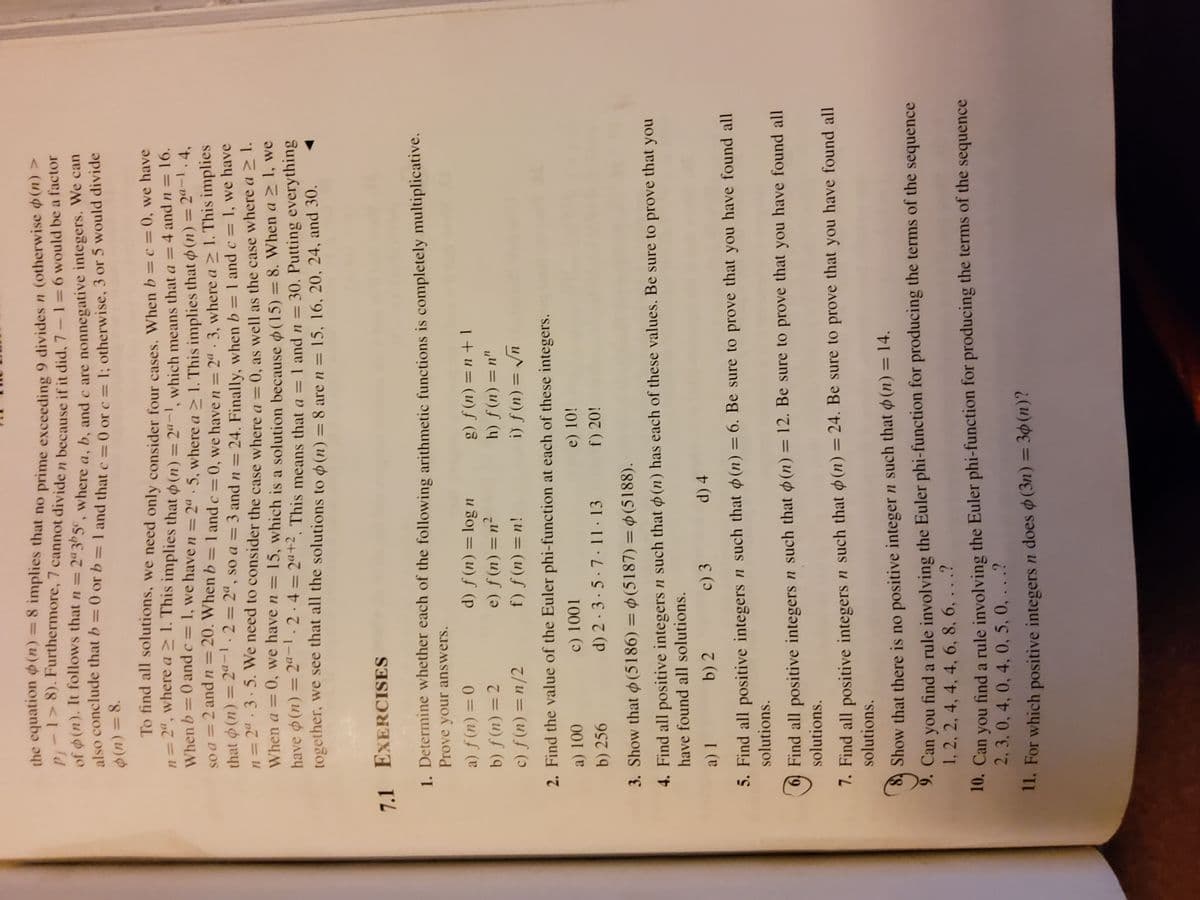2. Find the value of the Euler phi-function at each of these integers- e) 10! b) 256 d) 2.3-5-7-11- 13 f) 20!
2. Find the value of the Euler phi-function at each of these integers- e) 10! b) 256 d) 2.3-5-7-11- 13 f) 20!
Algebra & Trigonometry with Analytic Geometry
13th Edition
ISBN:9781133382119
Author:Swokowski
Publisher:Swokowski
Chapter1: Fundamental Concepts Of Algebra
Section1.2: Exponents And Radicals
Problem 92E
Related questions
Question
Using the Euler- Phi Function how can I solve 7.1 Question 2

Transcribed Image Text:the equation o (n) = 8 implies that no prime exceeding 9 divides n (otherWise oun
P:-1> 8). Furthermore,7 cannot divide n because ifit did. 7-1=6 would be a factor
of (n). It follows that n = 2ª3b5¢, where a. b. and c are nonnegative integers. We can
also conclude that b = 0 or b= 1 and that e=0 or c - : otherwise, 3 or 5 would divide
%3D
To find all solutions, we need only consider four cases, When b =c = 0, we have
n= 2", where a > 1. This implies that o(n) = 2a-1 which means that a =4 and n=
When b=0 and c= 1, we have n = 29. 5. where a> 1 This implies that o (n) = 2".4,
= 16.
%3D
%3D
so a = 2 and n=20. When b= 1 and c =0. we have = 2ª. 3. where a > 1. This implies
that (n) = 2ª-1. 2=2ª, so a = 3 and n = 24. Finally, when b = 1 and c= 1, we have
n= 24. 3. 5. We need to consider the case where a= 0, as well as the case where a 2 1.
%3D
%3D
%3D
When a = 0, we have n = 15, which is a solution because d(15) =8. When a I, we
have o(n) = 2ª-1.2·4= 2a+2. This means that a = 1 and n = 30. Putting everything
together, we see that all the solutions to o (n) = 8 are n = 15, 16, 20, 24, and 30.
%3D
%3D
%3D
7.1 EXERCISES
1. Determine whether each of the following arithmetic functions is completely multiplicative.
Prove your answers.
a) ƒ (n) = 0
b) ƒ (n) = 2
c) f (n) =n/2
u 301 = (u) f (p
h) f(n) = n"
%3D
%3D
I u= (u)f (
e) f (n) = n²
f) f (n)=n!
%3D
%3D
2. Find the value of the Euler phi-function at each of these integers.
u = (u)f (!
a) 100
c) 1001
e) 10!
b) 256
d) 2 · 3 · 5 · 7 · 11 · 13
f) 20!
3. Show that o (5186) = 0(5187) = $ (5188).
%3D
4. Find all positive integers n such that o (n) has each of these values. Be sure to prove that you
have found all solutions.
b) 2
c) 3
d) 4
5. Find all positive integers n such that (n) = 6. Be sure to prove that you have found all
solutions.
6) Find all positive integers n such that (n) = 12. Be sure to prove that you have found all
solutions.
7. Find all positive integers n such that (n)= 24. Be sure to prove that you have found all
solutions.
Show that there is no positive integer n such that (n) = 14.
9. Can you find a rule involving the Euler phi-function for producing the terms of the sequence
1, 2, 2, 4, 4, 4, 6, 8, 6, . . .?
10. Can you find a rule involving the Euler phi-function for producing the terms of the sequence
2, 3,0, 4, 0, 4, 0, 5, 0, . . .?
I1. For which positive integers n does o(3n) = 3¢(n)?
Expert Solution
This question has been solved!
Explore an expertly crafted, step-by-step solution for a thorough understanding of key concepts.
This is a popular solution!
Trending now
This is a popular solution!
Step by step
Solved in 4 steps with 4 images

Recommended textbooks for you

Algebra & Trigonometry with Analytic Geometry
Algebra
ISBN:
9781133382119
Author:
Swokowski
Publisher:
Cengage

College Algebra (MindTap Course List)
Algebra
ISBN:
9781305652231
Author:
R. David Gustafson, Jeff Hughes
Publisher:
Cengage Learning

Elements Of Modern Algebra
Algebra
ISBN:
9781285463230
Author:
Gilbert, Linda, Jimmie
Publisher:
Cengage Learning,

Algebra & Trigonometry with Analytic Geometry
Algebra
ISBN:
9781133382119
Author:
Swokowski
Publisher:
Cengage

College Algebra (MindTap Course List)
Algebra
ISBN:
9781305652231
Author:
R. David Gustafson, Jeff Hughes
Publisher:
Cengage Learning

Elements Of Modern Algebra
Algebra
ISBN:
9781285463230
Author:
Gilbert, Linda, Jimmie
Publisher:
Cengage Learning,

Algebra: Structure And Method, Book 1
Algebra
ISBN:
9780395977224
Author:
Richard G. Brown, Mary P. Dolciani, Robert H. Sorgenfrey, William L. Cole
Publisher:
McDougal Littell